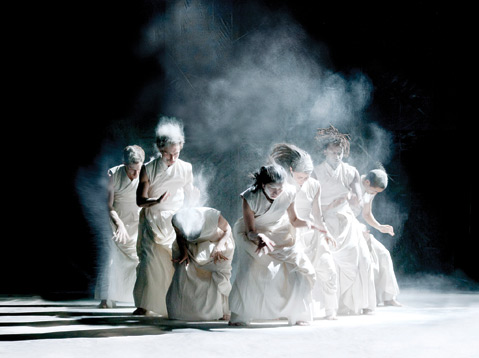Akram Khan Company Returns to Santa Barbara
Contemporary Dance Group to Perform Sunday, October 14

Photos of the terra-cotta warriors, the poetry of Rumi and William Blake, Leonardo da Vinci’s painting of the Last Supper — this is where Akram Khan begins his creative process. “We spend a year preparing,” the U.K.-based choreographer explained over Skype last week. “We create the soil in which the seed will be planted.” Two years ago, Akram Khan Company had its Santa Barbara premiere with bahok, a meditation on cultural dislocation and the search for connection. This Sunday, the company returns with Vertical Road, Khan’s more recent investigation of body, spirit, and the tension between them. Khan spoke to me from London.
The title of this work is Vertical Road. What does the vertical plane represent to you? A lot of our research was done on images and poetry, particularly from the Middle East. Whether we were looking at representations of spirituality in Christianity or in Islam, we saw that there was a common representation of humans below on Earth, and angels and God above in the sky. The orientation was always vertical. Non-spiritual scenes were almost always on horizontal axis. I was just fascinated by the concept of verticality.
You were also inspired by Rumi’s poetry. Was there a particular poem that spoke to you? It was one very particular poem. In it, Rumi writes about beginning as mineral and dying and being reborn as vegetable, then animal, then human, and finally as an angel that flies away. So I loved the sense of ascension and transformation. I was inspired by many different ideas and concepts, as well. For example, the costumes for this work are modeled after the terra-cotta warriors of China. I also read an article about how much meteorite dust falls to Earth every year. The author suggested that if we all stood still long enough, we’d all be covered in dust. So we play with dust in the show. Dust is closely connected to death for me, and the concept of death became very important in the work.
The eight dancers in Vertical Road come from Spain, Egypt, Algeria, Taiwan, Slovakia, Greece, and Korea, as well as the U.K. Is that internationalism intentional? It’s not the reason I picked them. But I wanted one or two dancers from the Middle East because I became fascinated by Rumi and wanted people who embodied this notion of spirituality. Spirituality for me is formless, and a body is form. How do we create a sense of formlessness through the body? This was a huge challenge, but then I saw this one Egyptian dancer perform, and I thought, “That’s spirituality — whatever he does has a sense of spirituality.”
I’m trained in kathak, which is classical Indian dance, but most of my dancers are Western trained. It’s fascinating to see the difference between the more scientific Western body and someone who comes from the Middle East. I find that Asian bodies tend to reflect spirituality more readily and clearly than Western bodies because of the culture and the way they are raised.
Do you train your dancers in kathak, and if so, what do they have to learn? I train them in kathak when I have time. But I don’t train them to be kathak dancers; I share with them some principles that I take into my research with my own body. With my body, it’s inseparable. In their bodies, they’re wearing it like a coat. Technically speaking, I can teach certain things like the sense of turning. A lot of my work is based on the spiral, where the top is turning one way and the hips the other. This tension is like the winding of a cloth. There are a lot of spirals and turns in my work — it can be quite hypnotic.
How active are your dancers in the creative process? They’re very involved. I may give them a task to create a sequence. Then they teach it to me, I adapt it in my own body, and they redo it based on what I did. So it’s a process of taking it, transforming it, and giving it back. From the beginning to the middle of the creative process, it’s very open. I only become a dictator toward the end.
It’s not easy to get support for dance, especially in America, but also in the U.K. Why do you think dance is important? That’s an understatement. In America, it’s impossible. There’s no structure for money from the government. I think art is important. I think art lacks money in America. In Europe, it’s getting harder, but thankfully I think art still transcends politics and religion. Dance in particular can speak to you in a way that is very truthful and honest without the baggage of being attached to words. It’s a very powerful medium to speak to people, and sometimes transform people’s way of thinking. It’s so important to have art in one’s life. Without it, we’re just empty vessels.
4•1•1
Akram Khan Company will perform Vertical Road at the Granada Theatre (1214 State St.) on Sunday, October 14, at 7 p.m. For tickets, call (805) 893-3535 or visit artsandlectures.sa.ucsb.edu.



